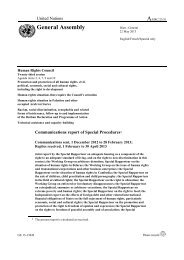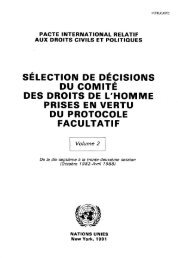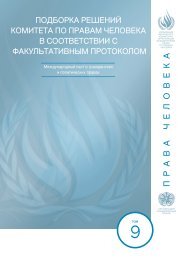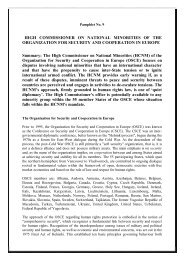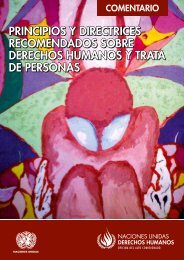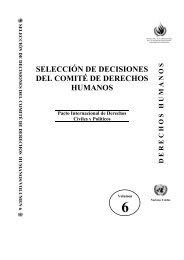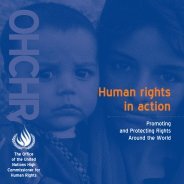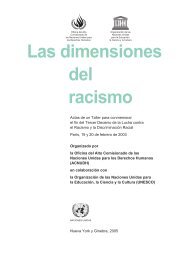good governance practices for the protection of human rights
good governance practices for the protection of human rights
good governance practices for the protection of human rights
You also want an ePaper? Increase the reach of your titles
YUMPU automatically turns print PDFs into web optimized ePapers that Google loves.
IV.<br />
COMBATING CORRUPTION<br />
Corruption may be defined as <strong>the</strong> abuse <strong>of</strong> entrusted public power <strong>for</strong> private<br />
benefit. While <strong>good</strong> <strong>governance</strong> refers to <strong>the</strong> exercise <strong>of</strong> authority through political<br />
and institutional processes that are transparent and accountable and encourage<br />
public participation, corrupt <strong>governance</strong> fails to <strong>of</strong>fer citizens adequate<br />
and accurate in<strong>for</strong>mation about government and policies, curtails <strong>the</strong> public’s<br />
opportunities <strong>for</strong> participation, violates <strong>the</strong> public’s right to be in<strong>for</strong>med about<br />
government activities and procedures, and compromises <strong>the</strong> right to political<br />
participation. Thus, corruption weakens <strong>the</strong> accountability <strong>of</strong> State <strong>of</strong>ficials, reduces<br />
transparency in <strong>the</strong> work <strong>of</strong> State institutions and allows <strong>human</strong> <strong>rights</strong><br />
violations to go unpunished.<br />
Corruption has a negative impact on <strong>the</strong> realization <strong>of</strong> basic <strong>rights</strong>. Corrupt <strong>practices</strong><br />
divert funding aimed at social services. In this manner, corruption undermines<br />
<strong>the</strong> Government’s ability to deliver an array <strong>of</strong> services, including health,<br />
education and welfare services, which are essential <strong>for</strong> <strong>the</strong> realization <strong>of</strong> economic,<br />
social and cultural <strong>rights</strong>. Corruption particularly affects <strong>the</strong> poorest and<br />
most marginalized, who greatly depend on public services. Corruption also discriminates<br />
in <strong>the</strong> access to public services in favour <strong>of</strong> those able and willing to<br />
<strong>of</strong>fer bribes.<br />
Corruption can weaken democratic institutions both in new and in longestablished<br />
democracies. Corrupt public <strong>of</strong>ficials fail to keep <strong>the</strong> interests <strong>of</strong><br />
society in mind when taking decision, leading to a loss <strong>of</strong> public support <strong>for</strong><br />
democratic institutions. In such situations, people become discouraged from<br />
exercising <strong>the</strong>ir civil and political <strong>rights</strong> and from demanding that <strong>the</strong>se <strong>rights</strong><br />
be respected.<br />
In countries where corruption is pervasive in <strong>the</strong> administration <strong>of</strong> justice, <strong>the</strong> implementation<br />
<strong>of</strong> a country’s laws as well as ef<strong>for</strong>ts to re<strong>for</strong>m <strong>the</strong>m are impeded by<br />
corrupt judges, lawyers, prosecutors, police <strong>of</strong>ficers, investigators and auditors.<br />
Such <strong>practices</strong> compromise <strong>the</strong> right to equality be<strong>for</strong>e <strong>the</strong> law and <strong>the</strong> right to<br />
a fair trial. They especially undermine <strong>the</strong> poor’s access to justice, because <strong>the</strong>y<br />
cannot af<strong>for</strong>d to <strong>of</strong>fer or promise bribes. Importantly, corruption contributes to a<br />
culture <strong>of</strong> impunity, since illegal actions are not consistently punished and laws<br />
are not consistently upheld.<br />
Strategies to combat corruption share a great deal with <strong>human</strong> <strong>rights</strong> principles.<br />
In particular, anti-corruption initiatives stress <strong>the</strong> importance <strong>of</strong> transparency and<br />
accountability, putting emphasis on <strong>the</strong> right to request and obtain in<strong>for</strong>mation<br />
from State <strong>of</strong>ficials, as well as on <strong>the</strong> importance <strong>of</strong> providing in<strong>for</strong>mation in an<br />
easily accessible and understandable manner.<br />
The cases presented in this chapter illustrate anti-corruption ef<strong>for</strong>ts that have<br />
relied on <strong>human</strong> <strong>rights</strong> and <strong>good</strong> <strong>governance</strong> principles, such as accountability,<br />
transparency and inclusion, and have had a positive impact on <strong>the</strong> <strong>protection</strong> <strong>of</strong><br />
<strong>human</strong> <strong>rights</strong>. They present a variety <strong>of</strong> strategies and tools:<br />
59



